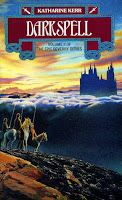"The world, the magic, the mystery, not to mention a cast of very real characters -- distinctive and original, THE GOSSAMER MAGE wove a spell that kept me reading well past 'lights-out.' "
~ Gemmell Award-winner, Helen Lowe
When you're asked to read a fellow author's work with a view to a cover blurb, it's a pretty big deal. Firstly, because it's an honour to be asked. Secondly, because you have to feel you can make the time to do the work and the reading justice. And thirdly – hauntingly! – because there's always that secret fear that even if you've enjoyed every other book by the particular author, what if you don't like this one?
As the quote featured above tells you, however, this third fear did not come to pass with The Gossamer Mage by Canadian author, Julie Czerneda. In fact, I would say it was quite the opposite – and although the quote does encapsulate my opinion of The Gossamer Mage, which is about to be released on 6 August, I would like to expand on it a little today.
I've said that I found the book "distinctive and original", and since those are pretty big words for any work of Fantasy, which is so deeply grounded in myth, fairytale, legend, and history, I'd like to focus on what made me feel that way about The Gossamer Mage.
This is a book by Julie Czerneda I'm talking about, so of course the worldbuilding is going to be masterly and the characters interesting. As a reader, I also had a reasonable expectation that I could rely on the plot to hold together. In my view, though, it's the magic system that binds all these elements into a cohesive whole and lifts The Gossamer Mage into that category of the distinctive and fresh.
If I were to play devil's advocate to myself, I could then point to elements of the magic system that one might find in other stories. For example, Ursula Le Guin's Earthsea may have cemented the importance of equilibrium to the magic of the Archipelago, but many fantasy stories deal with the ideas of the need for limitations on magic and a cost being exacted by its use. The price (or prices, because there is more than one depending on who in the society wields the magic) exacted in The Gossamer Mage is not one I have encountered before, however, and I particularly liked the way it pervaded every aspect of the magic and the world. I thought the magic system was very well thought through in that respect.
As the pen on the cover suggests, the magic practiced by the male mages, and in a different form by the Hold Daughters and their Designates – yes, this is a gender-differentiated magic system, but no, not in the way one might necessarily expect – is one based on language. And in the case of the mages, the spellcasting is written. Again, one could point to the poets of Daniel Abraham's Long Price quartet, or Blake Charlton's Spellwright trilogy, for broadly similar concepts of magic – but the way the concept of written intentions works in The Gossamer Mage, and the way in which it ends being bound into a far larger notion of magic, bearing both on the protagonists within this story and their world, is distinct unto itself.
And I really liked the way what I thought was the story, exactly like the magic system, opened out into something far larger.
Sometimes, too (if not always) – and just to answer my own devil's advocate – what makes a story unique and fresh is not the individual elements but the way they are put together into a new pattern. In this case, I really like the way Julie has woven the elements of The Gossamer Mage's magic system together in a way that imbues her characters and the world---and into a tale with an overall, indefinable sort of something...
For me, The Gossamer Mage worked. When I reached the end and closed the (e-)cover, I felt satisfied. I also felt that I had never read a fantasy quite like it. (And, dear readers, let me assure you that I have read a LOT of Fantasy over the years. :-) )
If you are not already a Julie Czerneda reader and still wondering whether this is the Fantasy for you, then I would say that if you enjoy the work of Ursula Le Guin, or like Neil Gaiman's The Ocean At The End Of The Lane, and/or either of the works mentioned above---Daniel Abraham's Long Price quartet, or Blake Charlton's Spellwright trilogy---then you will probably enjoy The Gossamer Mage.
As noted in several other posts regarding Julie Czerneda's work, we are friends-in-writing, having met at NZ's Natcon in 2009 and remained in touch since. I read an electronic advance copy of The Gossamer Mage manuscript, which is published by DAW books.
~~~
About The Author: Julie Czerneda:
For over twenty years, Canadian author/ former biologist Julie E. Czerneda has shared her curiosity about living things through her science fiction, published by DAW Books, NY. Julie’s written fantasy too, the first installments of her Night’s Edge series (DAW) A Turn of Light and A Play of Shadow, winning consecutive Aurora Awards (Canada’s Hugo) for Best English Novel. Having completed her Clan Chronicles series with To Guard Against the Dark, Julie’s latest SF novel is Search Image, Book #1 of her new SF series, The Web Shifter’s Library, bringing back her beloved character Esen the Dear Little Blob. Julie’s edited/co-edited numerous award-winning anthologies of SF/F, including SFWA’s 2017 Nebula Award Showcase, but nothing prepared her for the sheer joy of opening her Clan Chronicles to fans of the series to produce Tales from Plexis, out December 2018. What’s coming next? Her new fantasy standalone, The Gossamer Mage, out August 2019, and so much more. Visit: www.czerneda.com. She is also on Twitter: @julieczerneda
~~~


















